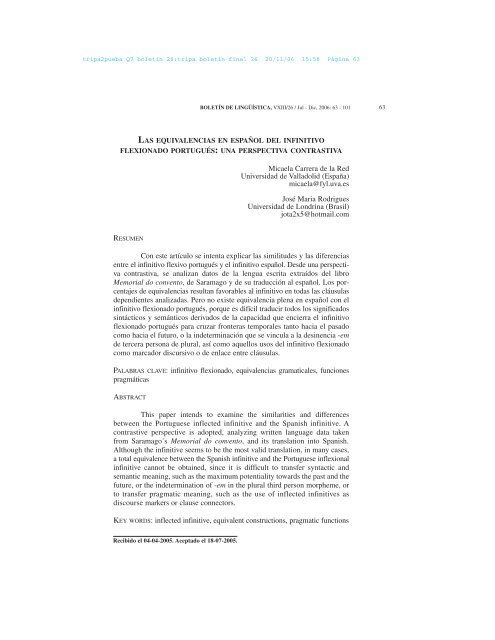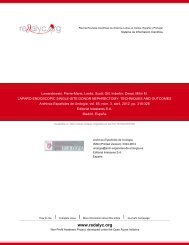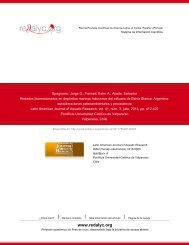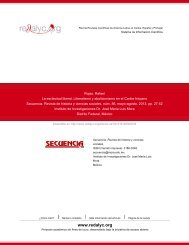Redalyc.Las equivalencias en español del infinitivo flexionado ...
Redalyc.Las equivalencias en español del infinitivo flexionado ...
Redalyc.Las equivalencias en español del infinitivo flexionado ...
You also want an ePaper? Increase the reach of your titles
YUMPU automatically turns print PDFs into web optimized ePapers that Google loves.
tripa2pueba Q7 boletin 26:tripa boletin final 26 20/11/06 15:58 Página 63<br />
LAS EQUIVALENCIAS EN ESPAÑOL DEL INFINITIVO<br />
FLEXIONADO PORTUGUÉS: UNA PERSPECTIVA CONTRASTIVA<br />
RESUMEN<br />
Micaela Carrera de la Red<br />
Universidad de Valladolid (España)<br />
micaela@fyl.uva.es<br />
José Maria Rodrigues<br />
Universidad de Londrina (Brasil)<br />
jota2x5@hotmail.com<br />
Con este artículo se int<strong>en</strong>ta explicar las similitudes y las difer<strong>en</strong>cias<br />
<strong>en</strong>tre el <strong>infinitivo</strong> flexivo portugués y el <strong>infinitivo</strong> <strong>español</strong>. Desde una perspectiva<br />
contrastiva, se analizan datos de la l<strong>en</strong>gua escrita extraídos <strong>del</strong> libro<br />
Memorial do conv<strong>en</strong>to, de Saramago y de su traducción al <strong>español</strong>. Los porc<strong>en</strong>tajes<br />
de <strong>equival<strong>en</strong>cias</strong> resultan favorables al <strong>infinitivo</strong> <strong>en</strong> todas las cláusulas<br />
dep<strong>en</strong>di<strong>en</strong>tes analizadas. Pero no existe equival<strong>en</strong>cia pl<strong>en</strong>a <strong>en</strong> <strong>español</strong> con el<br />
<strong>infinitivo</strong> <strong>flexionado</strong> portugués, porque es difícil traducir todos los significados<br />
sintácticos y semánticos derivados de la capacidad que <strong>en</strong>cierra el <strong>infinitivo</strong><br />
<strong>flexionado</strong> portugués para cruzar fronteras temporales tanto hacia el pasado<br />
como hacia el futuro, o la indeterminación que se vincula a la desin<strong>en</strong>cia -em<br />
de tercera persona de plural, así como aquellos usos <strong>del</strong> <strong>infinitivo</strong> <strong>flexionado</strong><br />
como marcador discursivo o de <strong>en</strong>lace <strong>en</strong>tre cláusulas.<br />
PALABRAS CLAVE: <strong>infinitivo</strong> <strong>flexionado</strong>, <strong>equival<strong>en</strong>cias</strong> gramaticales, funciones<br />
pragmáticas<br />
ABSTRACT<br />
BOLETÍN DE LINGÜÍSTICA, VXIII/26 / Jul - Dic, 2006: 63 - 101<br />
This paper int<strong>en</strong>ds to examine the similarities and differ<strong>en</strong>ces<br />
betwe<strong>en</strong> the Portuguese inflected infinitive and the Spanish infinitive. A<br />
contrastive perspective is adopted, analyzing writt<strong>en</strong> language data tak<strong>en</strong><br />
from Saramago´s Memorial do conv<strong>en</strong>to, and its translation into Spanish.<br />
Although the infinitive seems to be the most valid translation, in many cases,<br />
a total equival<strong>en</strong>ce betwe<strong>en</strong> the Spanish infinitive and the Portuguese inflexional<br />
infinitive cannot be obtained, since it is difficult to transfer syntactic and<br />
semantic meaning, such as the maximum pot<strong>en</strong>tiality towards the past and the<br />
future, or the indetermination of -em in the plural third person morpheme, or<br />
to transfer pragmatic meaning, such as the use of inflected infinitives as<br />
discourse markers or clause connectors.<br />
KEY WORDS: inflected infinitive, equival<strong>en</strong>t constructions, pragmatic functions<br />
Recibido el 04-04-2005. Aceptado el 18-07-2005.<br />
63

















